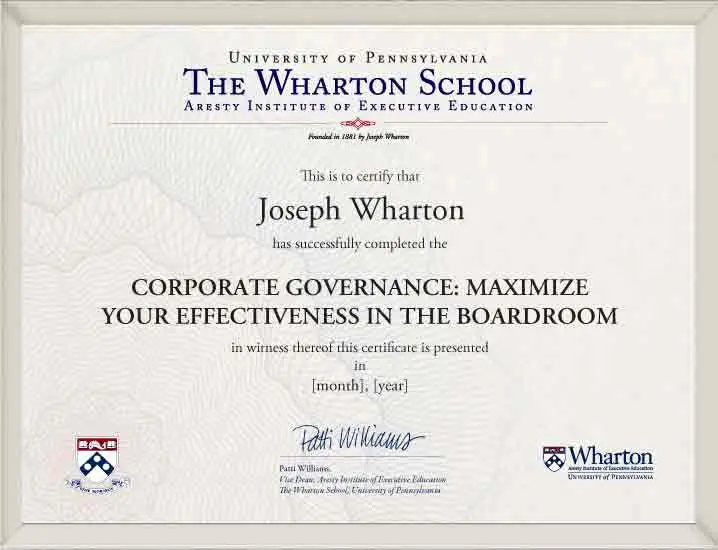Corporate Governance: Maximize Your Effectiveness in the Boardroom
Drive strategic directions and succeed as a board member
Who is this program for?
The Corporate Governance: Maximize Your Effectiveness in the Boardroom program is designed to give participants a deeper understanding of corporate governance and help boost their effectiveness on a corporate board.
The program is ideal for:
Current board members and senior executives interested in joining a board who want to understand the various aspects of proactive governance and help drive strategic direction, risk oversight and the establishment of compensation.
C-suite executives looking to explore the duties and nuances of board service, help strengthen their company's financial return, enterprise risk management and governance diversity, and learn to effectively take on existing and emerging issues.
Attorneys engaged in legal services who are seeking to learn the fundamentals of corporate governance from a variety of angles and how to assess the effectiveness and execution of governance roles and responsibilities.
Watch the Program Preview
Get a firsthand look at how this program strengthens your boardroom leadership and governance expertise.

Key Takeaways
Wharton’s Corporate Governance program explores the role, structure, and responsibilities of corporate governance to help you succeed as a board member. This program will enable you to:
Define the board’s role and responsibilities as well as characteristics of successful board leaders
Ensure proactive governance and learn how to prepare for potential risks
Recognize key considerations of compensation and succession planning
Define strategies for board members, executives, and other environmental, social, and governance (ESG) integrators to respond to conflicting demands and societal challenges to their organization
Plan for how to manage the competing interests of stakeholders and shareholders
Program Modules
Program Experience

Discussion Boards

Polls

Reflections

Industry Examples

Assignments

Live Office Hours

Try-it Activities

Self-Study Quizzes
Industry Examples
This online program provides real-world learning examples to help you understand the realities of corporate governance in practice through the experiential lens of leading global brands.

Analyze Apple’s board demographics to understand the value of diversity in background, experience, and skill sets.

Understand the importance of board accountability and how a captive board can reduce oversight in governance via this example of Disney’s board being comprised of friends and acquaintances of its president, Michael Ovitz.

Understand the impact of non-market factors through this example of the pharmaceutical organization, Mylan.

See how some companies (Starbucks,in this case) take diversity to heart and the influence that a diverse board can have.

Recognize the impact of diversity in background, experience, and skill sets through an analysis of Wells Fargo’s board composition.
Corporate Governance Handbook
This program enables you to explore the processes and responsibilities that drive corporate governance. It also includes a handbook where you can reflect on the program content and how it can help you succeed in a board member role. Topics addressed in the handbook include:
Laying the groundwork: Begin by drafting your director bio and exploring the importance of marketing yourself.
Conducting a personal skills audit: Assess your professional background to help you understand your strengths and any critical gaps in your knowledge or experience for board positions you’re seeking.
Finding your director doppelganger: Focus on strategically networking with directors who possess experience/characteristic profiles that are similar to yours, as they can help point you toward boards that are looking for a candidate with your profile.
Demonstrating your grit: Be able to persuasively articulate your experience in crisis/adversity situations.
Completing a leadership style assessment: Consider how your style informs the way you would manage various stakeholders, as well as which stakeholders you’re most comfortable interacting with and/or advocating for in the boardroom.
Putting the pieces together: Define and characterize your personal guiding principles via a concise and effective board value statement.
Faculty

Bantwal Family Goldman Sachs Presidential Associate Professor; Associate Professor of Management, Organizational Behavior, The Wharton School
Mary-Hunter McDonnell studies organizational behavior within challenging institutional contexts, such as contentious social environments and uncertain regulatory environments....
Guest Speaker

Partner, Mayer Brown
Sean McDonnell is a partner in Mayer Brown's Washington D.C. office and a member of the global Litigation & Dispute Resolution practice. Previously, Sean was an Assistant Unit...
Testimonials

Certificate
Upon successful completion of the program, you will earn a digital certificate of completion from the Wharton School.
Note: After successful completion of the online program, your verified digital certificate will be emailed to you in the name you used when registering for the program. All certificate images are for illustrative purposes only and may be subject to change at the discretion of the Wharton School.
Boardroom Readiness Program
FAQs
Didn't find what you were looking for? Write to us at learner.success@emeritus.org or Schedule a call with one of our Program Advisors or call us at +1 680 205 5118 (US) / +44 185 845 9995 (UK) / +65 3135 1422 (SG)
Early registrations are encouraged. Seats fill up quickly!
Flexible payment options available.
Starts On
